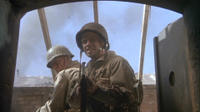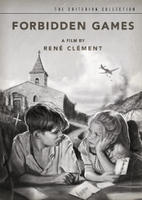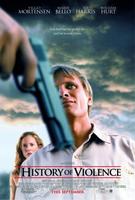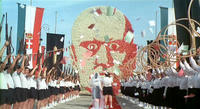Barton Fink (1991)
Published Saturday, October 01, 2005 by modium. Barton Fink (1991)
Barton Fink (1991)Barton Fink just may be my favorite Coen Bros. movie. Well, maybe not better than Fargo, because, I mean, c'mon. Oh yeah, Big Lebowski, too. Almost forgot Raising Arizona. Yeah, that sums up how good the Coens are.
Barton Fink is funny, intriguing and very well-written. It's a nice jab at Hollywood values and an interesting look into the mind of a writer, a very typical 'hired gun' in Hollywood. The mood of the film, is strange. It's got the dry Coen Bros. sense of humor, but the whole film has this very suspenseful, eerie atmosphere about it that gives it an almost otherworldly feel. When Barton enters the hotel and rings the service bell, it keeps echoing for a really long time, very eerie stuff. And who else would pop up from under the desk after this, but Steve Buscemi? Also, John Goodman's entrance is great. The Coens' play it in the next room, as he gets the call from the front desk and storms out of his room, the camera following him, unseen, through the wall. He pounds on the door, furiously, and it's startling. See John Carpenter's The Fog for another good example of atmospheric knocking.
John Goodman is great, especially here, and it's always nice to discover somebody with great depth of character in unexpected places. He plays so many different notes here, from frightening and imposing, to warm, friendly and oafish, to, once again, frightening and imposing. Turturro is also great, bringing an enthusiastic spark to his character as he spits out his idealistic values.
Netflix makes note of Barton Fink's Eraserhead hairdo in their synopsis, which is not only inaccurate, but has nothing to do with the film at all. Nonetheless, the idea stuck with me, and I found one great parallel between the two films. In Eraserhead, and something Mark Zimmer touches upon in his great review, is the fact that the child that the baby is horrible, literal manifestation of every parent's worst nightmare, that their child will end up being a monster. And, in Barton Fink, something along the same lines happens. The writer's paranoia and fear of deadlines takes on a grotesque, literal fear as he winds up being chased by a madman and hunted by the police, in a strange turn of events. I probably haven't explained it too well, but it makes some sense to me.
The Big Red One (1980)
Published by modium. The Big Red One (1980)
The Big Red One (1980)I'm not usually a big fan of war films. They all seem to blend into one another after a while, for me. Like any genre, there are some great works that transcend their respective genres, though. And, even if not, there are some great films set in the overall genre, nonetheless. The Big Red One, from what I understand, has been sorely neglected since its release, subsequently cut and recut by studios. Finally, thanks to Warner and Fuller's good friend Richard Schickel, we can now experience something close to Fuller's original vision of this very personal film.
The Big Red One's main focus is the camaraderie that develops between fellow soldiers during the war. It's important for a war film to have a specific focus, since war is such a vast subject, no single work can even begin to describe all the aspects of it in any kind of coherent detail. But, the relationship between the men in the Big Red One is the heart of the film. Just as the men themselves get to know and become fond of one another, so does the audience. And, Lee Marvin is great, stone-faced as usual, playing the sergeant who, in not so many words, becomes the surrogate father to these four young men. It's never spoken, but it's very easy to see it in their relationships, the Sarge abides, watching over all of them, letting them learn from their own mistakes, but always protecting them.
A key moment in the film, in some ways, one that turns it on its ear, I've used as my still. Griff is securing the perimeter, as they say, and he opens a metal grate to find an enemy soldier prone, his rifle aimed out of the grate. The look on his face is one of madness, as he squeezes his trigger endlessly, yet has no ammo. Griff, further illustrating the brotherhood of soldierdom, recognizes this deranged action and mimics it continuously. Of course, his chamber is still full of bullets, but by now, he's too far gone to notice this. It's a brilliant, effecting scene that shows that a brotherhood develops between not only those fighting alongside one another, but those on opposite sides of a conflict.
Samurai I - Musashi Miyamoto (1954)
Published by modium.
Samurai I - Musashi Miyamoto (1954)
I saw Samurai I a while ago. Netflix proves it. Yet, when it came time to man up and finish the trilogy, I found I remembered nothing of the first film. So, I re-watched it, and sure enough, it was a completely alien experience. The very end of the film held a feeling of deja vu, but I'm surprised I remembered nothing of the film. But, it's better that way, I suppose. Amnesia: Great value!
The trilogy is based on a book that's called Japan's Gone With the Wind. It's easy to see why, a very sentimental story set in a country undergoing tenuous times and great change. Splitting it into 3 films is pretty wise to me, since Gone With the Wind is very, very long. But, as far as Samurai I goes, some of the film struck me as better read than performed. But, that's just me.
Mifune turns in a very good performance, as per usual. He's often accused of overacting, and I can see that to some degree. And yes, there's some of it here. But, for the most part, he hits all the right emotional notes key to his character. He hams it up, but he wouldn't be Mifune if he didn't.
A nice start, especially when it ramps up at the end. Way to leave me hanging, Inagaki!
I saw Samurai I a while ago. Netflix proves it. Yet, when it came time to man up and finish the trilogy, I found I remembered nothing of the first film. So, I re-watched it, and sure enough, it was a completely alien experience. The very end of the film held a feeling of deja vu, but I'm surprised I remembered nothing of the film. But, it's better that way, I suppose. Amnesia: Great value!
The trilogy is based on a book that's called Japan's Gone With the Wind. It's easy to see why, a very sentimental story set in a country undergoing tenuous times and great change. Splitting it into 3 films is pretty wise to me, since Gone With the Wind is very, very long. But, as far as Samurai I goes, some of the film struck me as better read than performed. But, that's just me.
Mifune turns in a very good performance, as per usual. He's often accused of overacting, and I can see that to some degree. And yes, there's some of it here. But, for the most part, he hits all the right emotional notes key to his character. He hams it up, but he wouldn't be Mifune if he didn't.
A nice start, especially when it ramps up at the end. Way to leave me hanging, Inagaki!
Forbidden Games (1952)
Published by modium. Forbidden Games (1952)
Forbidden Games (1952)Forbidden Games. Boy, those French love making films about kids. But, seriously, I dug Forbidden Games. Not 400 Blows dug, but dug it nonetheless.
Actually, the film's kind of strange. I thought it would be an account of the childrens' struggle to survive during the war. But, it's actually more about them forming a bond and growing together. In fact, the film's most telling moment is the very end. Paulette is kept at the Red Cross and she's forced to confront the fact that her parents are gone. She looks around and sees nothing but children crying and dealing with emotional pain. It's then that you realize her stay with Michel has been a reprieve. It's her own way of dealing with her loss, as a child. And, it's debatable as to whether she was better off with Michel, enjoying her childhood or actually dealing with her loss. Clement's film is pretty sentimental, so it's obvious his feelings lie more with Michel, but it leaves the final decision up to the viewer.
It does a good job of showing childhood. Her parents have just died, but Paulette cares more about toting around her dead puppy, for whatever reason. It takes Michel to finally convince her to let go. Also, there are the childish infatuations and misunderstandings. They steal all the crosses they can find, to give their dead animals a better afterlife. Their symbolism to the church doesn't matter at all, they just want to build their perfect vision of a graveyard. Ideas like this are so great and so universal that it's hard to imagine that they haven't really been exploited heavily throughout the history of cinema. Well, at least not yet.
The Pornographers (1966)
Published by modium.
The Pornographers (1966)
Kinky exploits, indeed! I enjoyed the Pornographers, for the most part. Not a life-changing experience, but an entertaining film and definitely a welcome change of pace. Pretty funny, in a very absurd way. You know, I don't really know what else to say about the Pornographers. It's good and it's got a weird-looking fish in it.
Kinky exploits, indeed! I enjoyed the Pornographers, for the most part. Not a life-changing experience, but an entertaining film and definitely a welcome change of pace. Pretty funny, in a very absurd way. You know, I don't really know what else to say about the Pornographers. It's good and it's got a weird-looking fish in it.
A History of Violence (2005)
Published by modium. A History of Violence (2005)
A History of Violence (2005)Thanks to the always-kind folks at the Providence Phoenix magazine, I was invited to a free advance screening of Cronenberg's latest work, A History of Violence. It was actually a few days before the film's opening, but because of my huge backlog, it's been out since yesterday as of this writing. D'oh!
As a film, it was slightly disappointing, actually. But, the more I think about it, in retrospect, the more it stays with me. But, the film, for me, was a great chance for some deep and intelligent explorations of the very nature of violence. While it does do that to some extent, most of the film falls into a pretty standard Hitchcockian thriller mold. While it's better than 99% of the crap Hollywood's producing, it seems like they dropped the ball in really exploring these themes as deep as they could have. But, I guess that's the compromise between intelligent filmmaking and entertaining the masses.
The scenes with Tom's son felt very cheesy to me, like they were straight out of an after-school special. And this is coming from someone with plenty of bully experience in High School, heh. But, it's interesting to see him go off the handle, suggesting the possible inheritance of a violent nature, conjuring up the title.
There are a couple of sex scenes that seem extremely forced, which isn't surprising, given this is Cronenberg. But, they seem out of place, and honestly, I felt uncomfortable watching them. The first scene isn't too tasteful, but it seems normal enough, a young married couple enjoying a night alone. But, the second scene begins with her fleeing from Tom in terror, and he pins her on the staircase and pretty much rapes her, as her guard is slowly let down, ultimately consenting. This says something about the nature of violence and its relation to sexuality, as well as how much of a turn on brutish, masculine power is. But, it still seems really out of place in the film.
But, like I said, the more I think about it, especially in today's moviegoing climate, the more the film grows upon me. It's another great film from Cronenberg.
Masculin feminin (1966)
Published by modium. Masculin feminin (1966)
Masculin feminin (1966)So, Godard. I've actually enjoyed most of his work, despite its emptiness. I read an interview with Ingmar Bergman a while back where he just bashed Godard to no end, and even though I like Godard, it was still pretty funny and he made some good points. He singled out Masculin Feminin, probably because, for some asinine reason, it was shot in Sweden. Bergman called it mind-numbingly boring. Try as I might to like it, I can't help but agree with him.
Maybe it's the Swedish setting, but I'm reminded of the I am Curious films. Godard seems to like to throw random intertitles into conversation for no reason at all, and it's very distracting and pretentious. There's a scene early on where Jean-Pierre Leaud is talking to Chantal Goya and they're basically just babbling, then she asks him a very deep question, one that I was interested in. Leaud's reaction is shock, he can't believe that this girl actually wants to hold an intelligent conversation and explore something meaningful. And if that's not a reflection of Godard's style, I don't know what is. The film is just meaningless conversations, a completely empty style with no soul whatsoever.
French Cancan (1955)
Published by modium. French Cancan (1955)
French Cancan (1955)Now this is more like it! I didn't like Elena and Her Men, but French Cancan is, thankfully, another success for Renoir. Like all Renoir films, upon first viewing, it's hard to explain why I love the film. It's just got a very friendly, easygoing vibe that casts a spell on you. But, that's Renoir's awesomeness for you.
The driving force behind the story is the conception of the famed Moulin Rouge, and, for me, the dancers' preparations for their show. In the tradition of many a sports film, you get to see them start as novices, and through the inevitable montage, you see them progress, and it's hard not to get swept up in their story and be won over by their cheerful determination. Heck, that interested me far more than the romance/jealousy part of the plot.
It's fun. It's really, really fun. Awesome.
I Fidanzati (1962)
Published by modium. I Fidanzati (1962)
I Fidanzati (1962)I love Olmi's Il Posto. For me, it's one of the little-known gems in the Criterion Collection. I've been waiting to see I Fidanzati for a while, since it's impossible to find anything else by him. That said, I don't really know how to feel about the film. The good part is that it's very emotional, very true, very tender, and it's extremely thought-provoking. But, it didn't do much to engage me. In fact, despite its strengths, it was kind of boring to me. I think it's strange that I can be bored by a film, but still have it make an emotional impact on me.
I Fidanzati is a simple story, a young couple is separated due to the man's work, offering him an opportunity to make more money working in a Milan. The film covers their partition and the emotions that they feel, once apart. Without one another, all alone, there's a sense of a banal monotony, also something Olmi covered in Il Posto. The man tries his hardest to settle into Milan, and even though it was his own choice, he just can't seem to become comfortable in his surroundings.
Some of the most impressive parts of the film are the slow, seemingly meaningless stretches. During these, because the film is all about the couple, you find yourself thinking about them, wondering what they're thinking about, wondering what memories they're conjuring up to try to comfort themselves. It's a great example of the less-is-more principle of filmmaking. Somehow, this gives the feeling a very genuine feeling of emotion, and personally, it had a big impact on yours truly.
Crash (2004)
Published by modium. Crash (2004)
Crash (2004)I tried to catch Crash in its initial run, but it was pretty much impossible. Then word of mouth spread and it hit #52 on IMDB. After seeing the film, I have no idea. It's not a bad movie, it's very well done. It raises a few interesting questions and explores a tough topic, but all in all, it feels a little stale and the tone of the film seems very counterproductive to me.
In the film, almost everyone is angry. There's this pervading intensity in the film that almost never lets up, and naturally, leads to a lot of unnecessary tragedy. But, everyone is just brimming with anger, and it seems a bit too contrived and convenient to the story. To compare it to another film tackling racism in America, Do the Right Thing, which slowly introduces all its characters and lets you get to know them intimately and care for them, whereas in Crash, you don't really like any of the characters, and you only feel bad for them because they're victims of racism. But, they're different films that handle the subject in different ways, I suppose. In fact, it's been 15 years, and a lot can change in that time.
But, that aside, the film is very well done, and certainly makes a good case for racism. Maybe the constant anger makes its point against racism best, I'm not the definitive judge. Haggis has made a very powerful, if flawed statement that will hopefully open a few American minds. We can only hope.
Camera Buff (1979)
Published by modium. Camera Buff (1979)
Camera Buff (1979)I've really liked all the Kieslowski I've seen. Blue is a beautiful masterpiece, White and Red are both great, the Decalogue is great and a Short Film About Love is very good, but admittedly worked better as a 1-hour part of the Decalogue. I don't know why, but I didn't like Camera Buff much. I really had high hopes for it, very high hopes, but it just kind of rubbed me the wrong way.
The storyline is pretty intriguing and ends up working pretty well. The biggest problem I had, I guess, is that I couldn't understand the way Filip's wife was acting. I don't understand why she was getting so upset over the fact that he found a hobby. He didn't seem obsessed with it, and it wasn't destructive or harmful in any way. Also, he seemed to be okay with the fact that she was trying to sabotage his aspirations, like she was justified.
It's kind of silly to blame my dislike of the film on one little aspect of the story, but it's really all I can remember not liking. It's a good film, but only slightly better than average to me. Cinema sure is funny
Story of a Prostitute (1965)
Published by modium.
Story of a Prostitute (1965)
Story of a Prostitute is a very melodramatic film from freewheeling Japanese director Seijun Suzuki. Almost all of his films deal with gangsters or the Japanese yakuza, so it's strange to see him helming a film of such a different nature. Honestly, I think he worked better with the gangster films, simply because he knew them best.
Story of a Prostitute isn't a bad film, it's more than entertaining. But, it feels extremely manipulative. It relies on some fairly cheap tactics in terms of setting and music/editing to further it's emotional impact, which some people don't mind, but it bothers me to no end.
Visually, the style is very bold and effective. Many Japanese directors, most notably Suzuki, have great command of the 2.35:1, aka Scope, frame. Suzuki frequently places people on opposite sides of the frame during conversations, or places action off to one corner of the screen when it could very easily be shown in the center. One one hand, it shows a ton of bravura and looks very pleasing to the eye. On the other hand, it may seem kind of shallow and definitely calls attention to itself, which some might say is the biggest no-no in shooting film.
The plot, actually, reminds me a lot of Shakespeare's Romeo and Juliet. Actually, reminds me of how I feel about Romeo and Juliet, rather. There are many different ways of interpreting any work of art, so my views are simply my own. But, for my money, Romeo and Juliet were never in love. Look at Romeo, he's a mopey emo kid whining about how his ex left him. Then, there's Juliet, wishing for something more in her idyllic but ultimately dreary life. They meet, and it's strictly puppy love. They get so worked up over it that they take it to the extreme and kill themselves. Heck, I know I've acted impulsively under the influence of young love, and still do. But, therein lies the tragedy and effect of Shakespeare's story. That's what Story of a Prostitute reminds me of; two people that blindly fall for one another out of circumstance, with tragic consequences.
Story of a Prostitute is a very melodramatic film from freewheeling Japanese director Seijun Suzuki. Almost all of his films deal with gangsters or the Japanese yakuza, so it's strange to see him helming a film of such a different nature. Honestly, I think he worked better with the gangster films, simply because he knew them best.
Story of a Prostitute isn't a bad film, it's more than entertaining. But, it feels extremely manipulative. It relies on some fairly cheap tactics in terms of setting and music/editing to further it's emotional impact, which some people don't mind, but it bothers me to no end.
Visually, the style is very bold and effective. Many Japanese directors, most notably Suzuki, have great command of the 2.35:1, aka Scope, frame. Suzuki frequently places people on opposite sides of the frame during conversations, or places action off to one corner of the screen when it could very easily be shown in the center. One one hand, it shows a ton of bravura and looks very pleasing to the eye. On the other hand, it may seem kind of shallow and definitely calls attention to itself, which some might say is the biggest no-no in shooting film.
The plot, actually, reminds me a lot of Shakespeare's Romeo and Juliet. Actually, reminds me of how I feel about Romeo and Juliet, rather. There are many different ways of interpreting any work of art, so my views are simply my own. But, for my money, Romeo and Juliet were never in love. Look at Romeo, he's a mopey emo kid whining about how his ex left him. Then, there's Juliet, wishing for something more in her idyllic but ultimately dreary life. They meet, and it's strictly puppy love. They get so worked up over it that they take it to the extreme and kill themselves. Heck, I know I've acted impulsively under the influence of young love, and still do. But, therein lies the tragedy and effect of Shakespeare's story. That's what Story of a Prostitute reminds me of; two people that blindly fall for one another out of circumstance, with tragic consequences.
Grizzly Man (2005)
Published Thursday, September 29, 2005 by modium. Grizzly Man (2005)
Grizzly Man (2005)I've wanted to check out Grizzly Man for a while, and have been waiting endlessly for a theater nearby to show it. The small, artsy theater downtown finally stopped holding over Broken Flowers for 'one more week!' and decided to bless us with Herzog's latest masterpiece. And yes, I said masterpiece. Watching the film, I was completely enthralled, and my mind never once wandered, and was always kept completely occupied. Naturally, I thought it was great, but a few days afterwards, it lingered with me. Sure, some films stay with you for a while afterwards, once in a while popping into your thoughts. But, Grizzly Man held a lot of space in my mind, and still does, almost a week later. A good way to describe it is when you're trying to forget a lover, yet you can't get them out of your head.
So, I have to wonder, what is so special about Grizzly Man, that it has this effect on me? It's not the bears, as I've no leaning for or against them, really. Of course, technically, it's all top-notch. But, what I keep coming back to is the fact that it makes me think. It may not have the same effect on anyone else, but the film continues to make me think about it, to try and ponder its questions, argue them in my own head, ask others their opinions, and try to put myself in the shoes of those presented in the film.
Of course, the film is about Timothy Treadwell, a man who spent 13 summers living with the grizzly bears in Alaska. He spent a lot of his free time speaking at elementary and high schools around the country, telling stories and facts all about the bears he knew so closely, and all pro bono. If you read anything on the film, it comes as no surprise, a few moments in, when it's revealed that Treadwell was killed by a bear on his last trip to Alaska. I didn't think this had much bearing on the film, but it obviously does, the more I think about it, because you know that no matter what, he's still going to end up dead at the end of the story. So, when you see him getting along with bears and trying to assimilate, no matter how much progress he might be making, you still know he died at the hands (paws?) of one of them. Of course, that raises a whole bunch of rhetorical questions that the film explores.
Why did Treadwell die, after all he did for these bears? One man interviewed said that Treadwell crossed an invisible boundary and that it was an inevitability, but those who knew and loved Treadwell offer other possible explanations. Then, of course, you have to wonder about the intelligence of the bears, did they have any idea that Treadwell was trying to help them, or did they simply see him as an intruder after all this time? Naturally, your brain starts working on the next line of questioning, are we really that different from bears? What would happen if a bear tried to assimilate into our culture, as silly as it sounds? Even now, my mind keeps branching off, attempting to think about all of these different ideas.
From the moment I first saw a Herzog film, I knew that he was a man obsessed with obsession. He allowed himself to be consumed entirely by his works, and his works usually centered on those consumed with their own works, notably Brian Sweeny Fitzgerald in Fitzcarraldo. And, it's interesting to note the parallels between Herzog's work and Treadwell's work. In fact, if it weren't a documentary, I'd be certain that Treadwell was a creation of Herzog's, through and through. In fact, I started to doubt the validity of the film in some parts, and still do, just because it's Herzog, ever the phrankster. He did the same thing with Incident at Loch Ness, but that was incredibly funny and mostly opaque, while Grizzly Man is mainly a serious examination of Treadwell's life and death.
Timothy himself is a mixed bag. He's very charismatic, and it's hard not to be won over by his enthusiasm, his friendly nature and his generosity. Yet, there's a sense of uneasiness about him. As you watch him, you can sense the dread, simply because he's so consumed with his obsession, you're sure it will be his downfall. I was impressed most with his love for the bears. Obviously, he loves them, but it's something more than that, and though it may not be the right way to describe it, it reminds me much of Faith. These bears have done absolutely nothing for him, really, yet he's making it his life's work to study them, live with them, and protect them the best he can, and he asks nothing in return, except for their safety and happiness.
There are quite a few funny parts in the film, like Treadwell's rant on the park service (you'd think Scorsese wrote the dialogue here), his constant compulsive perfectionism as he tries to get parts of his footage just right, and a moment where a fox runs off with his hat. In fact, the foxes add a great touch, as they're very cute and it's heartwarming to see Treadwell getting along with them.
It's not entirely one-sided, though. There are a few people who disagreed with what Treadwell was doing. Even the people closest to him, who loved him, ultimately paint an unflattering portrait of him, even his own parents, citing his bout with alcoholism. Yet, that's one of Grizzly Man's themes, an honest portrait of a man doing what he thought was right, for better or worse.
Kontroll (2003)
Published Wednesday, September 28, 2005 by modium. Kontroll (2003)
Kontroll (2003)Kontroll is an interesting little film that I found when looking for Bela Tarr's work on Netflix. It sounded pretty good, so I went ahead and took the plunge. I wasn't disappointed at all, as it's a very fun, fast-paced, exhuberant gem of a film. Even more surprising, it's a debut, this one from Nimrod Antal. Certainly one Hungarian filmmaker to keep an eye on! But I digress...
The film is somewhat like a day-in-the-life, the subjects being a group of young adults working as ticket checkers in a train station inm Hungary. Because of the language barrier, the one word that applies most that is never used, would have to be "slacker". In fact, some of their exploits reminded me a bit of Clerks, but in a very different, far less raunchy way. Like Clerks, it also seems to relish the hell they have to put up with in order to make a living. And as Sarte said, Hell is other people. They're confronted with the most incompetant mix of customers you could ever hope for, from a pimp who offers one of his hos as payment, to a gaggle of Japanese tourists, from insane junkies, to more insane witches. Focusing on the universal truth; when you're working, customers suck.
It's an extremely stylish film, in terms of lighting, editing and plot development. Although there is quite a bit of substance to back it up, it's nothing compared to the juggernauts of cinema history. Then again, nobody asks Kontroll to do that. It's a very entertaining, very energetic film, and it stands on its own legs.
Amarcord (1974)
Published by modium. Amarcord (1974)
Amarcord (1974)So, Amarcord. I remember Amarcord being one of Bergman's favorite Fellini films, and though it's hard to explain why, it's easy to see. Both Amarcord and Bergman's best works share a very personal feel, both full of recollections and memories. I really liked Amarcord, but it's lack of cohesion holds it back from being as good as the rest of Fellini's work. It's really just a loose collection of childhood memories. Although it's really fun and not boring in the least, it lacks a sense of fullness that you get in, say, 8 1/2 or La Strada.
It's strange, all of the characters are easy to identify with. They all have a lot of basic traits, and are going through things that are universal and very relatable. Yet, they're often hard to tell apart, simply because Fellini throws a lot at you early on, and your brain isn't sure who and what to disregard as immaterial in terms of plot. There's also a big political message here that's mostly lost on me, simply because I'm not a political person, nor am I an historical person, so I'm certainly not one for politics from 30 years ago, despite how relevant they may be today. Amarcord's political message isn't so obvious that a layman like me understands it, but there's no denying it's there, so it's probably a good trait to have in the film.
The sense of wonder and recollection are extremely vivid in Amarcord, and it does a great job of transporting you into the time and place. In fact, at certain points, I could practically smell the soft breeze as a family travelled through the country. If the film even slightly resembles what actually was Fellini's youth, then it's not hard to imagine why his films are the way they are.
modium
- Rhode Island, United States
- My profile
Links
Other Nerds
Last posts
- crisp filmy - 3 weeks of Metal Gear!
- crisp filmy - Week of 5/26/08
- crisp filmy - Weeks of 5/12/08 & 5/19/08
- crisp filmy - Week of 5/5/08
- Favorite Films - New and Revised!
- Gates of Heaven (1978)
- Merry Christmas to Luke - 2001: A Space Odyssey (1...
- Sven Nykvist Memorial - Part 4: The Virgin Spring
- Modium goes region free!
- Sven Nykvist Memorial - Part 3: Crimes and Misdeme...
Archives
- 2005-06-26
- 2005-07-03
- 2005-07-10
- 2005-07-17
- 2005-07-24
- 2005-07-31
- 2005-08-07
- 2005-08-14
- 2005-08-21
- 2005-08-28
- 2005-09-04
- 2005-09-11
- 2005-09-18
- 2005-09-25
- 2005-10-02
- 2005-10-09
- 2005-10-16
- 2005-10-23
- 2005-11-06
- 2005-11-27
- 2006-01-29
- 2006-03-26
- 2006-04-02
- 2006-04-09
- 2006-04-30
- 2006-05-07
- 2006-05-28
- 2006-06-25
- 2006-07-09
- 2006-07-23
- 2006-08-06
- 2006-08-27
- 2006-09-03
- 2006-09-10
- 2006-09-17
- 2006-10-08
- 2006-11-19
- 2006-11-26
- 2006-12-03
- 2007-02-25
- 2007-06-17
- 2008-05-11
- 2008-05-25
- 2008-06-01
- 2008-06-22

